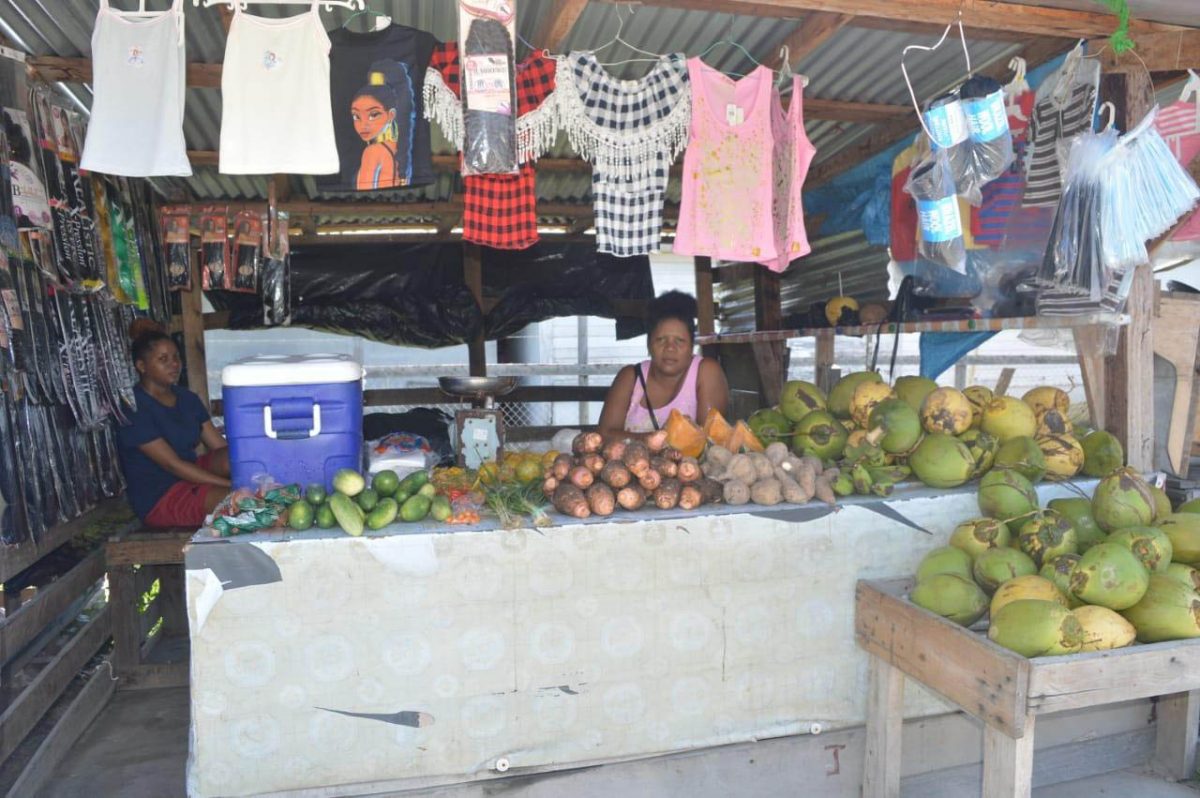These are not the best of times for market vendors. The overwhelming majority of them are women, many are single parents with young children, their attendant responsibilities extending way beyond plying their demanding trade in municipal markets across the country.
Janice Cornette has been vending fruit and vegetables at the Anna Regina Market on the Essequibo Coast for the past two years. This is just one of the pursuits which this 37-year-old mother of two girls has undertaken in order to make ends meet.
Before venturing into vending, Janice ran a modest kitchen garden, cultivating vegetables and selling them in the Richmond Village neighbourhood where she lives. That apart, she has taken a tilt at the beauty industry, braiding hair and selling hair accessories as well as “small things” for children… “Anything that I know would sell.” Christmases, Janice says, were not at all bad. That is the season of demand for ‘fancy’ hairdos.
She first ventured into vending in 2019, offering a range of fruit and vegetables. She worked there from Monday to Saturday. On Sundays she shifted her attention to the Suddie Market.
Just after midnight on Mondays she makes her way to the Charity Market to haggle with the farmers in order to get the best bargains she could for water coconuts, fruits and vegetables brought in from the Pomeroon. By 5:00 am she must conclude those transactions and return to the Anna Regina Market to begin the new trading week. The two best trading days, she says, are Mondays and Fridays. On Mondays she starts her trading at around 8:00 am and ends the day at 6 pm. Remaining on the job until 6 pm allows her to catch the sales from after-work shoppers.
What keeps her in the business, she says, are two virtues – patience and politeness. When you are “out there” looking for sales, she says, you are in a better position if you are prepared to be patient and polite.”
She ventures into the issue of pricing. It is, she says, a matter of arriving at determining what price the customer will pay then balancing that against her own profit margin.
In the fruits and vegetables market, she says, it is the retail customer who is “King.” They get to pick from what the vendors have. The vendor, frequently, has little choice. The middle men are relentless, mindful of their own profits. Sometimes, she says, produce is simply packaged in bags and sold ‘as is,’ a circumstance which, frequently, does not afford the vendor the ‘luxury’ of inspection for spoils. “There are times when what is spoilt and thrown out is your profit,” Janice says.
Friday, Market Day at Anna Regina, Janice says, is never short of hustle and bustle. The middle men, mostly from Parika and Berbice would arrive, as would some small farmers from along the Essequibo Coast. The simultaneous gatherings can sometimes be problematic. Trading is not often underpinned by principle as there are times when, having sold to the vendors, the middle men would then proceed to the retail customers directly, positioned as they are to undersell the vendors at the retail end.
Janice says she favours the fruit and vegetable suppliers from the Pomeroon. Unfortunately, Pomeroon has been hard hit by the bad weather. These days she must work with other small farmers who have quickly moved to fill the space rendered vacant by the flooded out Pomeroon.
Understandably, in the circumstances, prices have ‘gone haywire and in the absence of vegetables at affordable prices the less well-off have had to make changes to their diets. These days, Janice says, ‘shine rice’ and rice boiled in coconut milk have become some of the frequently cooked foods.
Even in what she says is a difficult situation Janice manages to secure sufficient vegetables to sell to her customers at a price that allows her to make a small profit. At this time, she says, some eddo and sweet potato are available. Cassava is hardly to be seen anywhere. Most of the cassava comes from the Pomeroon and much of it, these days, is under water. As we spoke she said that she had only just secured a quantity of boulanger at a price which she felt could bring her a modest profit. She felt she might have the same outcome with some ochro sold to her by another farmer.
Early last year, shortly after the outbreak of the COVID-19 pandemic. The floods had come about a month ago and had made things worse, Janice said. There have been times when she has to secure loans from her partner to ‘make’ the payments to the Middle Man. Still, she is determined to stay in business.






